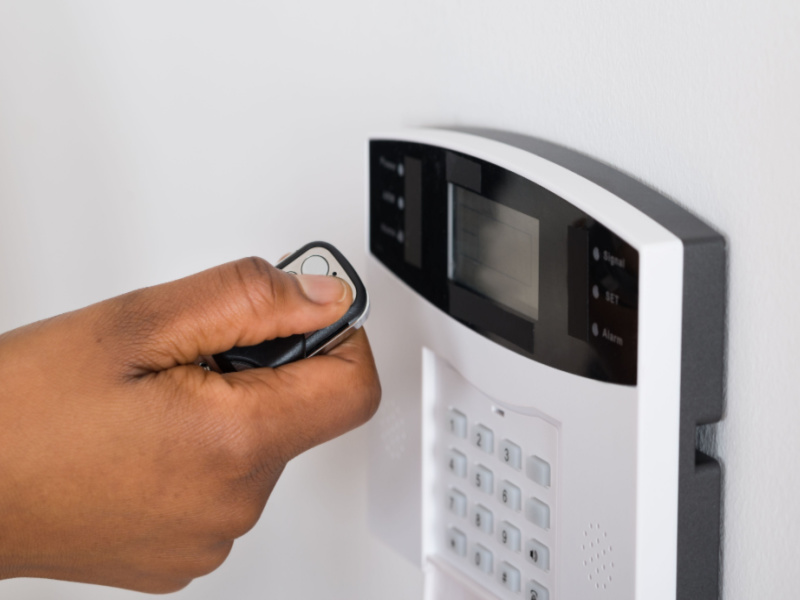4 Home Improvements for Keeping Your Insurance Premiums Low
Spending a little can save you a lot in the long run.

Spending a little can save you a lot in the long run.

If you’ve been thinking about completing any home improvement projects, consider this: Not only will sprucing up your place boost its value and make it more pleasant to live in, but home improvements can actually reduce your risks as an insurance policyholder. That means possibly keeping your home insurance premiums lower, even as homeowners insurance premiums are on the rise.
And while home renovation projects may seem expensive, there are ways to keep costs to a minimum while still getting great bang for your buck. Let’s explore how some specific home improvements can protect your home and even help you save money on your homeowners insurance.
Home improvement projects can yield significant insurance savings for two main reasons.
First, insurance companies like Lemonade offer discounts for installing systems like burglar alarms, sprinkler systems, and fire extinguishers, and for homes built from fire-resistant materials like masonry.
Second, by making your home safer from theft and vandalism and improving its resilience against extreme weather, investing in home improvement projects reduces the likelihood that you’ll need to file a claim—thereby keeping your monthly insurance costs down.
While not all home improvements will lower your monthly rates, certain home upgrades could qualify you for a Lemonade homeowners insurance discount.
Here are some home improvement projects to consider if you’re looking to elevate your property while reducing your insurance premium rates.

If you have an older home, consider upgrading your roof.
Given the damage caused by rain, snow, and ice, an old or poorly constructed roof will typically mean higher home insurance premiums, especially if your roof is leak-prone.
New roofs should be installed approximately every 15–25 years, depending on the materials they’re made from. In addition, be sure to check your roof at least twice a year for any damage, particularly after a big storm. If you live in an area vulnerable to heavy snowfall, consider upgrading your roof with materials specifically made to withstand snow and ice, such as steel.
Installing fire protective equipment in your home, such as fire sprinkles, smoke detectors, and fire alarms, not only protects you and your loved ones, but is another home addition that can lower home insurance premiums.
And by dispensing water in the event of an active fire, fire sprinklers are designed to reduce flames and cool the area to give occupants more time to escape. Such sprinklers can also lower property damage by 58% or more.

Security features that reduce the chances of theft and break-ins, such as burglar alarms and deadbolts, are another upgrade to consider. The cost reduction is based on just how effective your security system is, so if you are thinking about giving your home security a boost, it’s best not to skimp on quality.
You might want to consider a complete home system that alerts authorities if someone breaks into your home. Smart home technology has made today’s security’s systems highly sophisticated, and there are plenty of additional benefits to making your home a smart home. While it might be a pricey cost to bear up front, showing your insurer that you’ve installed a state-of-the-art home security system can help keep your premiums down and reduce the likelihood of losing your personal property to theft.
If you’re planning on building your dream home, use fire-resistant materials, such as stones, bricks, or steel. Building a home with these resilient materials reduces the risk of an accidental fire, and therefore, leads to lower home insurance costs.
Home insurance policies will not cover the costs of any upgrades or home improvement projects you choose to spruce up your home. But regular home maintenance reduces overall expenses in the long term by preventing infrastructure in your home from malfunctioning.
Should you decide to make any improvements to your home, let your homeowners insurance company know so you can ensure that you’re adequately covered and so you can see if you may qualify for a new discount. You’ll want to increase your reconstruction cost coverage if the improvements you’re making will substantially increase the value of your home.
Investing in home improvement projects is a big part of being a responsible homeowner—just like protecting your home with insurance that offers excellent coverage and is there when you need it. For easy sign-up, great coverage, and affordable rates, Lemonade can bring you peace of mind—and that’s truly priceless.
A few quick words, because we <3 our lawyers: This post is general in nature, and any statement in it doesn’t alter the terms, conditions, exclusions, or limitations of the policies issued, which differ according to your state of residence. You’re encouraged to discuss your specific circumstances with your own professional advisors. The purpose of this post is merely to provide you with info and insights you can use to make such discussions more productive! Naturally, all comments by, or references to, third parties represent their own views, and Lemonade assumes no responsibility for them. Coverage may not be available in all states. Please note that statements about coverages, policy management, claims processes, Giveback, and customer support apply to policies underwritten by Lemonade Insurance Company or Metromile Insurance Company, a Lemonade company, sold by Lemonade Insurance Agency, LLC. The statements do not apply to policies underwritten by other carriers.
Please note: Lemonade articles and other editorial content are meant for educational purposes only, and should not be relied upon instead of professional legal, insurance or financial advice. The content of these educational articles does not alter the terms, conditions, exclusions, or limitations of policies issued by Lemonade, which differ according to your state of residence. While we regularly review previously published content to ensure it is accurate and up-to-date, there may be instances in which legal conditions or policy details have changed since publication. Any hypothetical examples used in Lemonade editorial content are purely expositional. Hypothetical examples do not alter or bind Lemonade to any application of your insurance policy to the particular facts and circumstances of any actual claim.